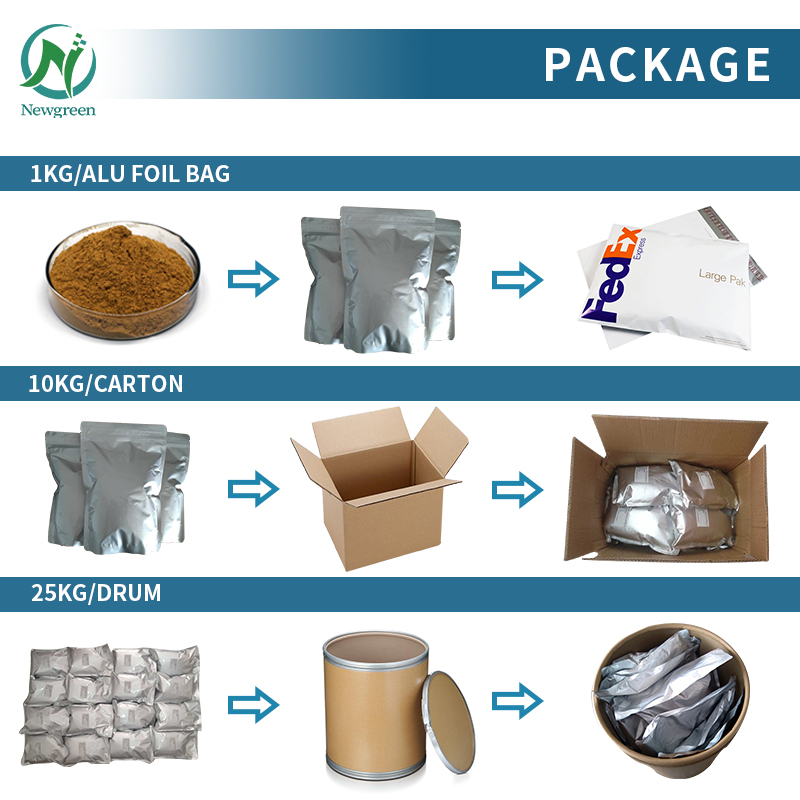Newgreen Supply High Quality Tomato Extract 98% Lycopene Powder

Product Description
Lycopene is widely found in tomatoes, tomato products, watermelon, grapefruit and other fruits, is the main pigment in ripe tomatoes, but also one of the common carotenoids.
Lycopene is a powerful antioxidant with antioxidant and anti-inflammatory properties. Lycopene is thought to be beneficial for cardiovascular health, eye health, and skin health. It is also widely used in skin care and supplements and may help protect skin from free radical damage, reduce inflammation, and improve skin texture. Lycopene is also thought to be beneficial in preventing certain chronic diseases, such as cardiovascular disease and cancer.
Food Sources
Mammals cannot synthesize lycopene on their own and must obtain it from vegetables and fruits. Lycopene is found mainly in foods such as tomatoes, watermelon, grapefruit and guava.
The content of lycopene in tomatoes varies with variety and ripeness. The higher the ripeness, the higher the lycopene content. The lycopene content in fresh ripe tomatoes is generally 31 ~ 37mg/kg, and the lycopene content in commonly eaten tomato juice/sauce is about 93 ~ 290mg/kg according to different concentrations and production methods.
The fruits with high lycopene content also include guava (about 52mg/kg), watermelon (about 45mg/kg), and guava (about 52mg/kg). Grapefruit (about 14.2mg/kg), etc. Carrot, pumpkin, plum, persimmon, peach, mango, pomegranate, grapes and other fruits and vegetables can also provide a small amount of lycopene (0.1 to 1.5mg/kg).
Certificate of Analysis
 |
NEWGREEN HERB CO., LTD Add: No.11 Tangyan south Road, Xi’an, China Tel: 0086-13237979303 Email: bella@lfherb.com |
|
Product Name: |
Lycopene |
Test Date: |
2024-06-19 |
|
Batch No.: |
NG24061801 |
Manufacture Date: |
2024-06-18 |
|
Quantity: |
2550kg |
Expiration Date: |
2026-06-17 |
| ITEMS | STANDARD | RESULTS |
| Appearance | Red Powder | Conform |
| Odor | Characteristic | Conform |
| Taste | Characteristic | Conform |
| Assay | ≥98.0% | 99.1% |
| Ash Content | ≤0.2% | 0.15% |
| Heavy Metals | ≤10ppm | Conform |
| As | ≤0.2ppm | <0.2 ppm |
| Pb | ≤0.2ppm | <0.2 ppm |
| Cd | ≤0.1ppm | <0.1 ppm |
| Hg | ≤0.1ppm | <0.1 ppm |
| Total Plate Count | ≤1,000 CFU/g | <150 CFU/g |
| Mold & Yeast | ≤50 CFU/g | <10 CFU/g |
| E. Coll | ≤10 MPN/g | <10 MPN/g |
| Salmonella | Negative | Not Detected |
| Staphylococcus Aureus | Negative | Not Detected |
| Conclusion | Conform to the specification of the requirement. | |
| Storage | Store in a cool, dry and ventilated place place. | |
| Shelf Life | Two years if sealed and store away from direct sun light and moisture. | |
Function
Lycopene has a long chain polyunsaturated olefin molecular structure, so it has a strong ability to eliminate free radicals and anti-oxidation. At present, the research on its biological effects mainly focuses on antioxidant, reducing the risk of cardiovascular disease, reducing genetic damage and inhibiting the development of tumor.
1. Enhance the body's oxidative stress ability and anti-inflammatory effect
Oxidative damage is considered to be one of the main causes of increasing incidence of cancer and cardiovascular and cerebrovascular diseases. The antioxidant capacity of lycopene in vitro has been confirmed by many experiments, and the ability of lycopene to quench singlet oxygen is more than 2 times that of the currently commonly used antioxidant beta-carotene, and 100 times that of vitamin E.
2. Protect heart and blood vessels
Lycopene can deeply remove vascular garbage, regulate plasma cholesterol concentration, protect low-density lipoprotein (LDL) from oxidation, repair and improve oxidized cells, promote the formation of intercellular glia, and enhance vascular flexibility. One study showed that serum lycopene concentration was negatively correlated with the incidence of cerebral infarction and cerebral hemorrhage. Studies on the effect of lycopene on rabbit atherosclerosis show that lycopene can effectively reduce the levels of serum total cholesterol (TC), triglyceride (TG) and low density lipoprotein cholesterol (LDL-C), and its effect is comparable to that of fluvastatin sodium. Other studies have shown that lycopene has a protective effect on local cerebral ischemia, which mainly inhibits the activity of glial cells through antioxidant and free radical scavenging, and reduces the area of cerebral perfusion injury.
3. Protect your skin
Lycopene also reduces skin exposure to radiation or ultraviolet (UV) rays. When UV irradiates the skin, the lycopene in the skin combines with the free radicals produced by UV to protect the skin tissue from destruction. Compared with the skin without UV irradiation, the lycopene is reduced by 31% to 46%, and the content of other components is almost unchanged. Studies have shown that through the usual intake of foods rich in lycopene can fight UV, to avoid UV exposure to red spots. Lycopene can also quench free radicals in epidermal cells, and has obvious fading effect on old age stains.
4. Boost immunity
Lycopene can activate immune cells, protect phagocytes from oxidative damage, promote the proliferation of T and B lymphocytes, stimulate the function of effector T cells, promote the production of certain interleukins and inhibit the production of inflammatory mediators. Studies have found that moderate doses of lycopene capsules can improve human immunity and reduce the damage of acute exercise to the body's immunity.
Application
Lycopene products cover food, supplements and cosmetics.
1. Health care products and sports supplements
Supplement health products containing lycopene are mainly used for antioxidant, anti-aging, enhance immunity, regulate blood lipids and so on.
2: Cosmetics
Lycopene has anti-oxidation, anti-allergy, whitening effect, can make a variety of cosmetics, lotions, serums, creams and so on
3. Food and beverage
In the food and beverage sector, lycopene has received "novel food" approval in Europe and GRAS (generally considered safe) status in the United States, with non-alcoholic beverages being the most popular. It can be used in breads, breakfast cereals, processed meats, fish and eggs, dairy products, chocolate and sweets, sauces and seasonings, desserts and ice cream.
4. Application in meat products
The color, texture and flavor of meat products change during processing and storage due to oxidation. At the same time, with the increase of storage time, the reproduction of microorganisms, especially botulism, will also cause meat spoilage, so nitrite is often used as a chemical preservative to inhibit microbial growth, prevent meat spoilage and improve meat flavor and color. However, studies have found that nitrite can combine with protein breakdown products to form carcinogens nitrosamines under certain conditions, so the addition of nitrite in meat has been controversial. Lycopene is the main component of the red pigment of tomatoes and other fruits. Its antioxidant ability is very strong, and it has good physiological function. It can be used as a fresh-keeping agent and coloring agent for meat products. In addition, the acidity of tomato products rich in lycopene will reduce the pH value of meat, and will inhibit the growth of spoilage microorganisms to a certain extent, so it can be used as a preservative for meat and play a part in replacing nitrite.
5. Application in cooking oil
Oxidation deterioration is an adverse reaction that often occurs in the storage of edible oil, which not only causes the quality of edible oil to change and even lose its edible value, but also leads to various diseases after long-term ingestion.
In order to delay the deterioration of edible oil, some antioxidants are often added during processing. However, with the improvement of people's food safety awareness, the safety of various antioxidants has been constantly proposed, so the search for safe natural antioxidants has become a focus of food additives. Lycopene has superior physiological functions and strong antioxidant properties, which can efficiently quench singlet oxygen, remove free radicals, and inhibit lipid peroxidation. Therefore, adding it to cooking oil can alleviate oil deterioration.
6. Other applications
Lycopene, as a highly potential carotenoid compound, cannot be synthesized by itself in the human body, and must be supplemented by diet. Its main functions include lowering blood pressure, treating high blood cholesterol and hyperlipids, and reducing cancer cells. It has a significant effect.
Package & Delivery



















